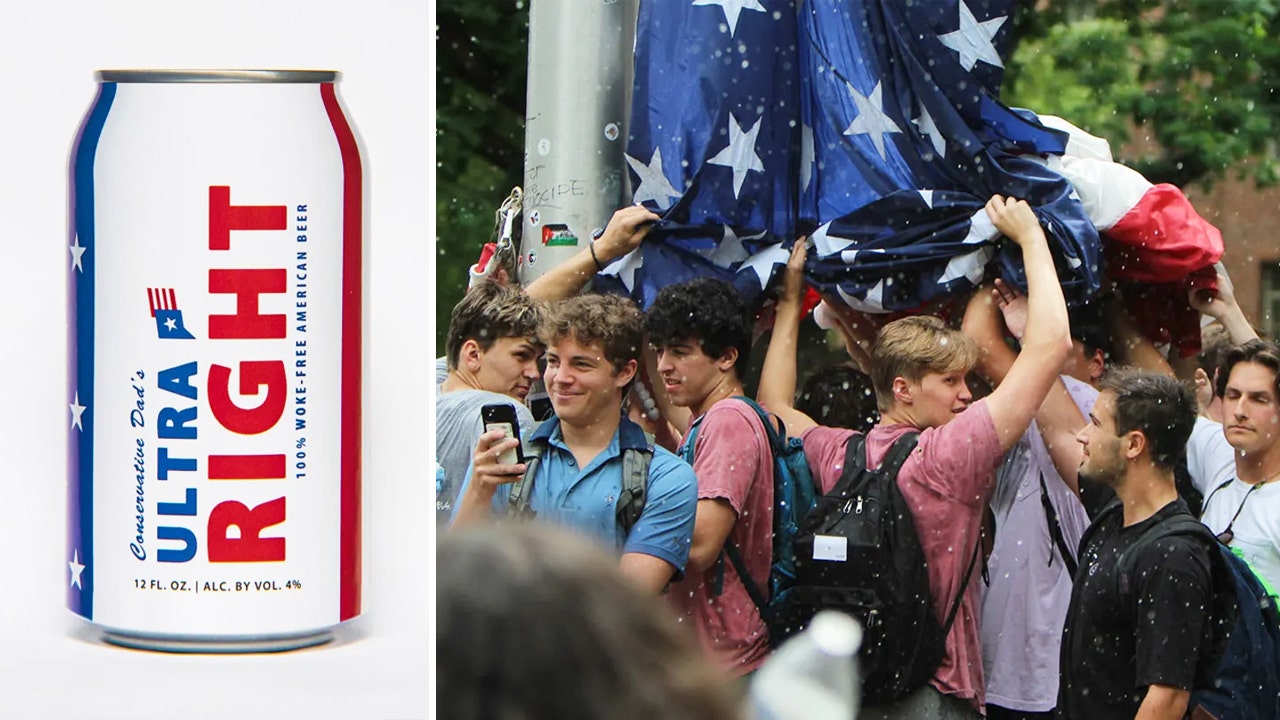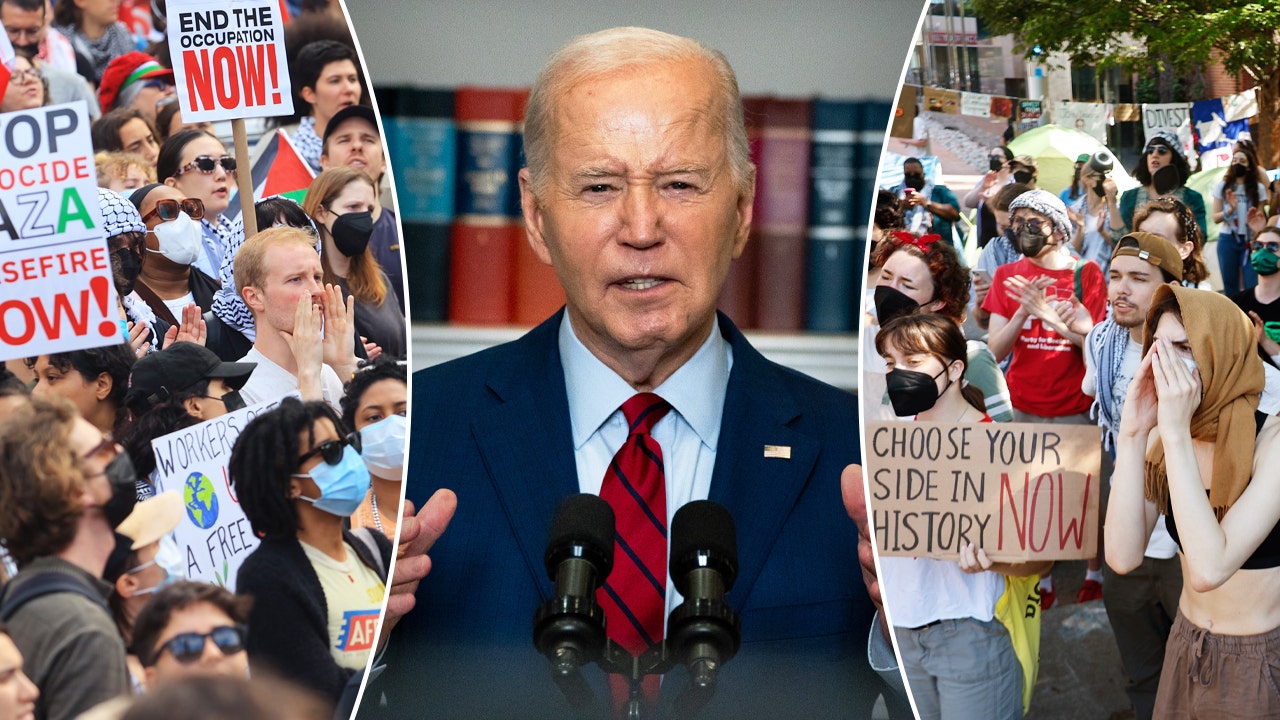Maryland
Qahwa Corner: Let’s See Each Other, a Mental Health Chat with Imam…
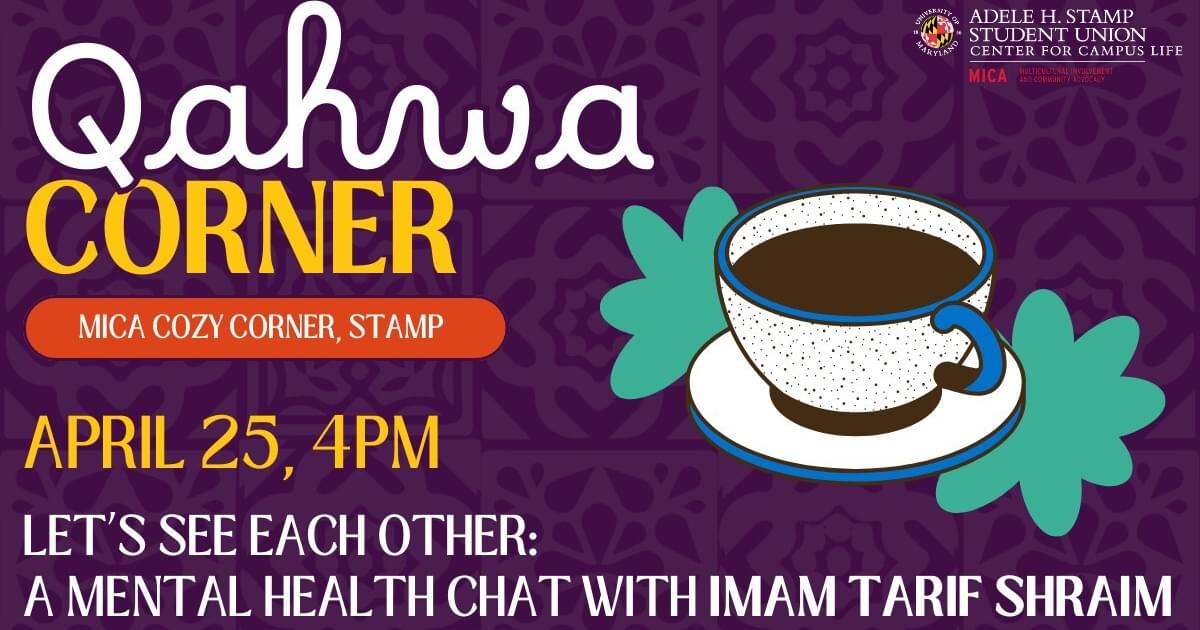
To
Adele H. Stamp Student Union
Introducing Qahwa Corner! A series of low-key chats, hangouts, and meetups that you can expect to continue throughout the year in the MICA Cozy Corner. Make connections, grab some tea or coffee, and a snack! Qahwa Corner: Let’s See Each Other, a Mental Health Chat with Imam Tarif April 25, 4pm | MICA Cozy Corner Let’s talk mental health in this current moment. What does it look like to balance school, life, family, current events, etc. – but give everything the attention it deserves? Is it even possible? Tarif Shraim, UMD’s Muslim Chaplain, will join us to lead the discussion.
Location
hzewdie@umd.edu
Contact
Event Tags
Schools and Units
Audience
Tags
Event Topics

Maryland
Maryland baseball splits Saturday’s doubleheader at Rutgers

After Maryland baseball defeated Rutgers on Friday in game one of its three-game weekend series, they played the remaining two games on Saturday due to potential weather issues on Sunday.
In a pitcher’s duel in game one, the Terps went 0-7 with runners in scoring position and lost, 2-1, forcing a game two rubber match, which Maryland won, 6-4.
Maryland has won consecutive Big Ten series as it heads into the bye week.
Maryland loses the pitching duel in game one, 2-1
Joey McMannis got the nod from head coach Matt Swope in the first game of the day. The right-hander started his outing with three consecutive scoreless innings, working out of two jams.
Maryland tallied the first run of the game in the second inning, when Rutgers’ Donovan Zsak walked Elijah Lambros with the bases loaded.
McMannis found himself in trouble in the fourth inning, as Johnny Volpe blasted a two-run single, giving Rutgers the lead. McMannis was subsequently pulled for Evan Smith.
On the afternoon, McMannis gave up six hits, two earned runs and four walks, while striking out four batters, in 3 ⅔ innings. Despite a solid showing, it was an earned loss for the freshman.
Smith had a phenomenal performance out of the pen, notching 4 ⅓ scoreless innings, giving up two hits and walking one batter. He also totaled three strikeouts, worked two 1-2-3 innings and only allowed three total base runners.
Zsak, Sonny Fauci and Joe Mazza were exceptional on the mound for the Scarlet Knights. Combined, they gave up just five hits, one run and five walks. As well, seven Terps struck out in game one.
Despite numerous opportunities, the Terps faltered by stranding eight runners on base. While Rutgers also struggled, leaving 10 runners on base, it was Maryland’s inability to capitalize in crucial moments that proved costly. In the fifth inning, the Terps found themselves with the bases loaded and no outs, but a strikeout, infield fly and groundout in succession dashed their hopes of scoring multiple runs in game one.
Maryland puts up two three-run innings to win game two, 6-4
Logan Koester and the Scarlet Knights’ Jake Marshall got game two started, trading scoreless innings through the first three frames, with the Terps failing to earn a base runner.
Marshall simmered down in the fourth inning, though. He allowed two singles, and then proceeded to throw two passed balls during Brayden Martin’s at-bat, which allowed Eddie and Chris Hacopian to score. Martin finished the at-bat with an RBI single to drive in Sam Hojnar.
On the other side, Tony Santa Maria hit a solo home run, cutting Maryland’s lead to just two in the bottom of the fourth.
Rutgers tied the game up in the fifth inning, as Volpe continued his big day with a two-run double.
But Maryland snatched the lead right back sixth inning, as Sam Portnoy hit Devin Russell with a pitch to force in a run. Then, Elijah Lambros reinstated the three-run lead with a two-run double.
Koester pitched six innings for the first time in six weeks, looking like his early-season self. He gave up three earned runs on seven hits and struck out two batters.
Logan Berrier took the mound in the seventh inning and immediately gave up a run, as Cameron Love scored on a balk. Berrier redeemed himself in the final two innings, though, ending each inning after just three batters to secure the game and series.
Three things to know
1. Stellar pitching. Maryland only used four pitchers in two games on Saturday. McMannis, Smith, Koester and Berrier gave up a combined six runs in 18 innings.
2. Second straight Big Ten series win. After splitting the doubleheader, Maryland earned its second straight Big Ten series win after losing its previous four.
3. Varying offensive performances. Maryland was 0-7 with runners in scoring position and left eight runners on base in game one, as the Terps only scored one run. Game two was a different story, though, as the Terps posted two three-run innings.
Maryland
Several tons of beef recalled from Walmart, including stores in Maryland and Pennsylvania

Why food recalls are increasing
E.Coli, metal and even a dead bat have been found in recalled food. In fact, food recalls are increasing. Yet, that might actually be a good sign. Here’s why.
USA TODAY
More than 16,000 pounds of beef has been recalled over potential E. coli contamination from Walmart stores including locations in Pennsylvania and Maryland.
The U.S. Department of Agriculture on Wednesday announced the recall of meat products produced by Cargill Meat Solutions, a Hazelton, Pennsylvania, company. The raw ground beef items were produced on April 26-27 and shipped to stores nationwide.
Dozens of locations in Pennsylvania and Maryland are listed. No Delaware stores are on the list affected by the recall. A full list of stores that are subject to the recall can be found here.
TRADER JOE’S RECALL: Salmonella threat sparks concern
DELAWARE LEGISLATURE: Senate bill would ban plastic 6-pack rings by 2025
The products include ground beef and beef patty products. A list of potentially contaminated products and identifying markings can be found here.
A USDA press statement announcing the recall said there had been no confirmed reports of “adverse reactions” from the recalled products; however, federal officials are concerned that potentially contaminated beef subject to recall could be in peoples’ refrigerators or freezers. Products subject to the recall should be thrown away or returned to the place of purchase, according to the USDA statement.
Maryland
Maryland Enacts a “Draconian” Assisted Outpatient Treatment Program

In 1999, New York State passed the first Assisted Outpatient Treatment (AOT) law, which creates a regime of civil courts to force psychiatric interventions on those found to have “serious and persistent mental illness” who “struggle to engage voluntarily” with care. As of 2023, such laws were on the books in 47 states and the District of Columbia—leaving just Massachusetts, Connecticut, and Maryland as holdouts. In these three states, coalitions of psychiatric survivors, harm reductionists, peer advocates, disability rights advocates, and civil rights attorneys have fended off multi-year efforts to expand involuntary treatment. But last month in Maryland, HB 576 and SB 453, entitled Mental Health – Assisted Outpatient Treatment Programs, flew through the legislature after nearly 20 years of stalemate.
What made this year different? The answer lies largely in changing political winds, on both the state and national levels.
Nationally, the past eighteen months have witnessed an uptick in popularity for policies of psychiatric force among Democrats. In December 2022, New York City Mayor Eric Adams unveiled his controversial “involuntary removals” policy, allowing for the involuntary psychiatric detention of largely unhoused people who “appear mentally ill” in public.
In September 2023, California Governor Gavin Newsom’s Community Assistance, Recovery, and Empowerment (CARE) Court, which bears similarities to AOT, became law. CARE Court forces primarily unhoused people to accept court-ordered psychiatric interventions; any noncompliance with the orders could be used as evidence in a future conservatorship hearing.
And last month, California’s Prop 1, also championed by Governor Newsom, passed by a razor-thin margin. Prop 1 upends the millionaire tax-funded Mental Health Services Act and will reduce funding for voluntary, peer-delivered, and culturally-specific supports. Prop 1 also establishes a $6 billion bond, some of which would go toward building locked facilities to confine unhoused people who use drugs or have psychiatric disabilities.
These recent policy developments have a long, complex historical context. For over fifty years in America, pro-force family advocacy organizations, closely allied with the medical and judicial establishments, have worked to roll back the clock to the days when they had more legal control over the lives of those under their care.
Since the 1990s, the assault on the civil liberties of people deemed “severely mentally ill” has been led primarily by the Treatment Advocacy Center (TAC), a well-funded group whose efforts are fueled by a national grassroots network of family advocates. TAC can be said to be largely responsible for the spread of involuntary outpatient civil commitment laws throughout America. Early on, family advocates rebranded the law to the more politically palatable and benign-sounding “Assisted Outpatient Treatment,” and commenced selling their courts-as-care formula to politicians, the media, and the public.
AOT is not just a law; it is a philosophy and an approach that centers around “anosognosia,” a pseudeoscientific notion that a small subset of individuals labeled with serious and persistent mental illness are too ill to know they need help. Therefore, they must be “assisted” into a regime of civil courts that would theoretically ensure their ongoing treatment under supervision. In reality, the laws are drafted with fairly broad eligibility criteria.
True believers in AOT co-opt language from human rights and disability rights principles, claiming that it is a “less restrictive alternative” to jails, prisons, and psychiatric incarceration. Yet, in many of America’s underfunded and under-resourced community-based systems, it is often impossible for people to access care until and unless they are in a crisis. The help that is on offer is often largely biomedical in nature, with social determinants of health such as housing and community support left unaddressed, fueling cycles of distress.
Proponents of court-ordered treatment also frequently argue that it is voluntary. But coercion and force are baked deeply into these laws, from the “Black Robe effect” resulting from a judge’s presence in the room; to treatment orders that one usually has little say in or choice over; to the ever-present possibility of forced evaluation, hospitalization, or conservatorship for noncompliance.
How AOT came to Maryland
Maryland’s 2024 legislative session took place against the backdrop of policy changes favoring mandated treatment in New York and California. As with California’s proposals, this year the demand came from the top, with Maryland’s newly-elected Democratic governor Wes Moore making AOT a central part of his legislative agenda soon after election.
Governor Moore’s reasons for championing the legislation may have had something to do with his tenure as head of the Robin Hood Foundation, an anti-poverty nonprofit based in New York. Proponents of AOT widely view New York’s program as the gold standard, despite reports finding glaring racial disparities in its implementation. The governor’s own chief of staff, Eric Luedtke, has spoken openly about a family member’s diagnosis of schizoaffective disorder, and even testified in favor of the bill in February. And two new senior health officials, Secretary of Health Laura Herrera Scott and Deputy Secretary for Behavioral Health Alyssa Lord, also previously hail from New York.
Courtney Bergan, a Maryland attorney who identifies as a person with lived experience of involuntary institutionalization, told Mad in America that once the Moore administration sponsored the legislation, most opposition to the bill vanished. “The Democrats were like, ‘We don’t want to go up against a Democratic governor.’ That’s really what it came down to.”
Advocates immediately found the broad eligibility criteria alarming. Those with a “history of treatment nonadherence” who have had two hospitalizations, even voluntarily, within three years; or have self-harmed or attempted self-harm; or attempted suicide or an act of harm to others; or have made credible threats of harm to others during a three-year “lookback” period, would be deemed eligible for the program.
Under these criteria, “Essentially anybody with a mental illness could be put into AOT,” Bergan said.
Any adult with a relationship to the respondent can file the petition—as psychiatrist Dinah Miller wrote on X: “your mom, your kid, your roommate, your ex.” To move forward, the process requires the sign-off of only one psychiatrist, contravening Maryland’s own involuntary treatment certificate that requires two evaluators to agree.
Sole evaluators are “undeniably vulnerable to bias, whether explicit or unintentional,” according to testimony submitted to the legislature by On Our Own of Maryland, which coordinates the longest-running statewide network of independent peer-operated organizations in the nation. “This bill seems to propose much lower standards for civil commitment.”
Of equal concern to advocates was the near-unlimited range of interventions that would theoretically be allowed in a court-ordered treatment plan, including electroconvulsive therapy (ECT) or long-acting contraception.
Last month, Senator Clarence Lam, one of two physicians in the state legislature, introduced a bill amendment that would ban the involuntary use of long-acting injectable antipsychotic drugs and ECT in AOT orders. It would also protect reproductive rights by prohibiting a judge from ordering non-psychiatric medications or devices such as birth control implants.
Senator Lam’s chief of staff Scott Tiffin told Mad in America that the legislator had been hearing about AOT for years from Disability Rights Maryland, the public defender’s office, and others. He had examined the medical ethics literature on ECT and informed consent, and had seen troubling precedent involving judges’ violations of respondents’ reproductive rights. An AOT judge in Ohio had pressured a respondent to take long-acting contraception, and a guardianship judge in Massachusetts ordered a woman to have an abortion and undergo sterilization.
During their March 29 meeting, Finance committee members entered into an extended conversation about Senator Lam’s amendment, with some defending the practice of ECT. “ECT is a good thing and people should get it—that’s basically what was being said,” Bergan said. “It was wild.”
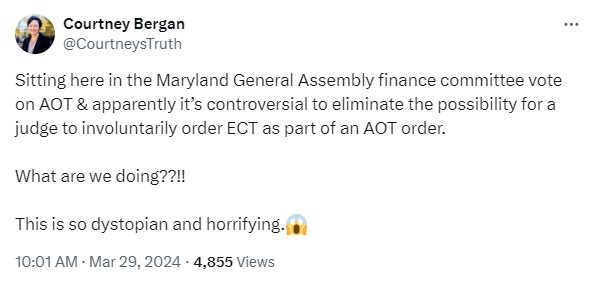
Senator Lam attempted to clarify his rationale to his colleagues: “…Because [ECT] is a very extreme measure, has some history there, can we put some limitations on that specifically?…Is that boundary a little bit too far for this to be ordered by a judge on someone without their consent?” But with scant support from fellow legislators or the Department of Health, Senator Lam withdrew the amendment at the next Finance committee meeting.
“I continue to be concerned about the lack of reasonable guardrails in the AOT bill,” he wrote in a statement emailed to Mad in America. “But, I hope the Department will take seriously the concerns about the rights of potential AOT patients as they begin implementation. I think it was important that the General Assembly included a five-year sunset on this bill so we will be able to keep a close eye on implementation.”
There was one small win in the bill, in the provision on psychiatric advance directives, highly under-utilized legal documents that outline a person’s wishes regarding treatment. A previous version of the bill said that such documents would be “considered”; in the final version, that word was crossed out and changed to “honored.” While the language reflects the aspiration that psychiatric advance directives will be respected in practice, nationwide trends do not bear this out.
A choice movement for mental health in Maryland
New, independent coalitions have emerged to challenge the steady advance of involuntary outpatient commitment laws. Californians Against Prop 1 and partners were nearly successful in defeating the ballot measure, forcing the governor to scramble for votes.
In Maryland, Bergan launched the “My Mind, My Choice” coalition, inspired by the messaging of the reproductive rights movement. “I want people to see that this could be them,” she said.
“What would you want if you were in this position? Do you want to be forced to take a medication that you feel has really harmful side effects? I want to change the narrative on this and make it about choice.”
The coalition is pursuing a multifaceted harm reduction approach to the new landscape. One strategy is to establish psychiatric advance directive clinics throughout the state to help people develop the most legally-sound documents. Another idea is to create a hotline for those facing inpatient and outpatient civil commitment, where anyone petitioned could obtain quick, free legal advice about their rights.
Advocates in Maryland are also exploring the promise of self-directed care, an approach to supporting people who would otherwise meet criteria for involuntary outpatient commitment that aligns with human rights principles of choice and bodily autonomy set forth in the UN Convention on the Rights of Persons with Disabilities.
This legislative session, Senator Lam introduced a self-directed care pilot bill drawing on the success of such programs in other states such as New York, Pennsylvania, Texas, and Utah.
This approach addresses underlying material issues driving participants’ distress by providing individualized peer support and funds for an array of supports they want and need.
While the bill did not move this year, Bergan said advocates hope to raise awareness among stakeholders and policymakers this year to galvanize support in 2025.

And then there were two…
Supporters of the law in Maryland adopted a narrative that AOT signified progress, claiming that their state “lags behind” those with involuntary outpatient commitment laws on the books. The bill noted in its preamble that only three states in the nation still lacked the authority to institute court-ordered mental healthcare. Now, just two states remain: Massachusetts and Connecticut.
Like Maryland, Massachusetts’ coalition has had to fight efforts to expand involuntary treatment annually, and this year is no different. At this writing, advocates are awaiting the outcome of a committee vote that will determine whether this year’s involuntary outpatient commitment bills, H.1694 and S.1238, will advance to the next phase of the legislative process.
Sera Davidow, executive director of the Wildflower Alliance, a Massachusetts peer support, advocacy, and training organization dedicated to harm reduction and human rights, told Mad in America that she has been tracking recent developments in Maryland as AOT returns to her state legislature. To educate and inform community engagement, she created an Involuntary Outpatient Commitment Information Center with a petition, sample letters to legislators, and videos featuring people who’ve experienced court-ordered psychiatric intervention. In one video, Earl, who identifies as a parent and a person with psychiatric history, said, “It’s going to make people go to the fringes. It’s going to make people hide, it’s going to make people run away.”
Wildflower Alliance and allied communities in Massachusetts are trying to build up non-coercive, human rights-based supports, circulating a petition in support of a significant peer respite bill currently moving through the state legislature. Davidow, along with Wildflower Alliance peer respite director Ephraim Akiva, advocate Thomas Brown, and Mental Health Legal Advisors drafted the bill, first introduced last year. It would fund at least one peer respite program in each of the state’s 14 counties, including the first two LGBTQ+ respites in the world.
The prospects of an involuntary outpatient commitment law passing in Connecticut remain slim for now. The administration and the legislature have not been enthusiastic about adopting the law over the last 25 years, and most statewide advocacy groups oppose it. Kathy Flaherty, executive director of the Connecticut Legal Rights Project, submitted testimony during Maryland’s legislative session this year noting that in her state, “Much time and effort has been expended on examining IOC, only to have the legislature reject it each time it is proposed.”
For her part in Maryland, Bergan remains steadfast, even as a potential bill looms in 2025 that could remove a key administrative barrier to rebuilding locked psychiatric facilities. “I just want people to know that even though it seems like we’re freaking failing, I’m convinced that it means we just need to be louder,” she said.
-

 News1 week ago
News1 week agoFirst cargo ship passes through new channel since Baltimore bridge collapse
-

 World1 week ago
World1 week agoHaiti Prime Minister Ariel Henry resigns, transitional council takes power
-

 World1 week ago
World1 week agoSpanish PM Pedro Sanchez suspends public duties to 'reflect'
-

 News1 week ago
News1 week agoAmerican Airlines passenger alleges discrimination over use of first-class restroom
-

 Movie Reviews1 week ago
Movie Reviews1 week agoAbigail Movie Review: When pirouettes turn perilous
-

 World1 week ago
World1 week agoEU Parliament leaders recall term's highs and lows at last sitting
-

 Science1 week ago
Science1 week agoMosquito season is upon us. So why are Southern California officials releasing more of them?
-

 Movie Reviews1 week ago
Movie Reviews1 week agoCity Hunter (2024) – Movie Review | Japanese Netflix genre-mix Heaven of Horror
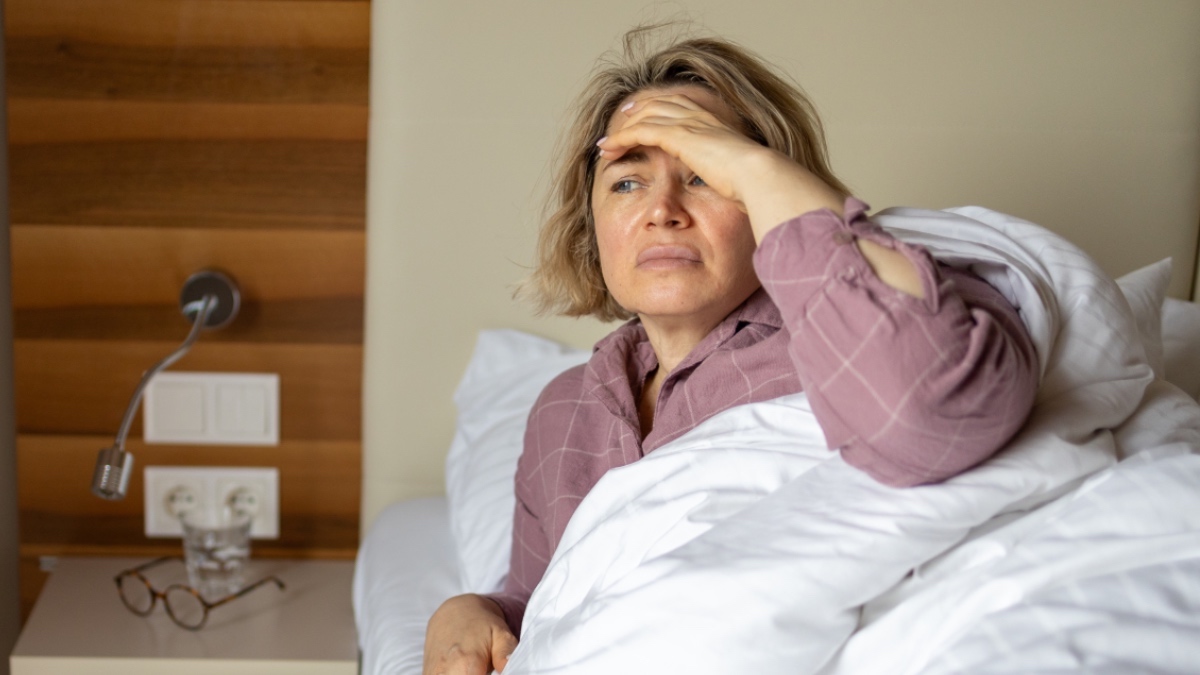


/cdn.vox-cdn.com/uploads/chorus_asset/file/25433387/Screenshot_2024_05_04_at_1.15.04_PM.png)

